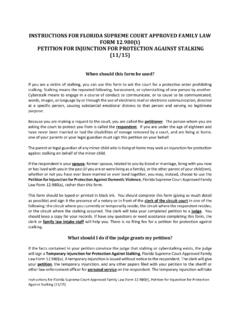Transcription of 1 On the Death Penalty: (excerpted) - projecttahoe
1 1 On the Death Penalty: (excerpted). 2 Maximilien Robespierre, speech given at the Constituent Assembly, France 3 June 22, 1791. 4. 5 The news having been brought to Athens that citizens had been condemned to 6 Death in the city of Argos, people ran to the temples, where the gods were called 7 upon to turn Athenians away from such cruel and dire thoughts. I come to ask, 8 not the gods, but legislators who should be the organs and the interpreters of 9 the eternal laws that the divinity dictated to men to erase from the code of the 10 French the blood laws that command judicial murders, and that their morals and 11 their new constitution reject.
2 I want to prove to them: 1- that the Death penalty is 12 essentially unjust and, 2- that it isn't the most repressive of penalties and that it 13 multiplies crimes more than it prevents them. 14. 15 Outside of civil society, if a bitter enemy makes an attempt on my life or, pushed 16 away twenty times, he returns again to ravage the field that I cultivated with my 17 own hands; since I have only my individual strength to oppose to his I must 18 either perish or kill him, and the law of natural defense justifies and approves 19 me. But in society, when the force of all is armed against only one, what 20 principle of justice could authorize it to kill him?
3 What necessity can absolve it? remove 21 A victor who kills his captive enemies is called a barbarian! A grown man who 22 kills a child that he could disarm and punish seems to us a monster! An accused 23 man condemned by society is nothing else for it but a defeated and powerless 24 enemy. Before it, he is weaker than a child before a grown man. 25. 26 Thus, in the eyes of truth and justice these scenes of Death that it orders with so 27 much ceremony, are nothing but cowardly assassinations, nothing but solemn 28 crimes committed not by individuals but by entire nations using legal forms.
4 29 However cruel, however extravagant the laws, do not be surprised: they are the 30 work of a few tyrants, they are the chains with which they weigh down the dictator 31 human race, they are the arms with which they subjugate it, they were written in harsh ruler/conquer 32 blood. 33 The Death penalty is necessary, say the partisans of ancient and barbarous supporters 34 routine. Without it there is no brake strong enough for crime. Who told you this? 35 Have you calculated all the gears by which penal laws can act on human 36 sensibility? Alas, before Death how much physical and moral pain can man 37 endure?
5 38. 39 Listen to the voice of justice and reason. It cries out to you that human judgments 40 are never certain enough to justify a society of men subject to error dealing Death 41 to another man ..Take from a man the possibility to expiate his crime by to make amends/. apologize 42 repentance or acts of virtue; pitilessly close off to him any return to virtue, self- 43 esteem, rush his descent, so to speak, into the tomb still covered by the recent 44 stain of his crime is, in my eyes, the most horrible refinement in cruelty. 45. 46 The first obligation of a legislator is to form and preserve public morals, the 47 source of all freedom, source of all social happiness.
6 When in running to a 48 particular goal he turns away from this general and essential goal he commits the 49 most vulgar and dire of errors. The king must thus present to the people the 50 purest model of justice and reason. If in place of this powerful, calm and 51 moderate severity that should characterize it they place anger and vengeance; if 52 they spill human blood that they could spare and that they have no right to spread;. 53 if they spread out before the people cruel scenes and cadavers wounded by 54 torture, it then alters in the hearts of citizens the ideas of the just and the unjust.
7 55 they plant the seed in the midst of society of ferocious prejudices that will 56 produce others in their turn. Man is no longer for man so sacred an object: we 57 have a less grand idea of his dignity when public authority puts his life at risk. 58 The idea of murder inspires less fear when the law itself gives the example and 59 the spectacle. The horror of crime is diminished when it is punished by another 60 crime. Do not confuse the effectiveness of a penalty with the excess of severity: 61 the one is absolutely opposed to the other. Everything seconds moderate laws.
8 62 everything conspires against cruel laws. 63. 64 It has been observed that in free countries crime was more rare and penal laws 65 more gentle. All ideas hold together. Free countries are those where the rights of 66 man are respected and where, consequently, the laws are just. Where they offend 67 humanity by an excess of rigor this is a proof that the dignity of man is not known 68 there, that that of the citizen doesn't exist. It is a proof that the legislator is 69 nothing but a master who commands slaves and who pitilessly punishes them 70 according to his whim. I thus conclude that the Death penalty should be 71 abrogated abolished 72.
9 73 Justification of the Use of Terror: (excerpted). 74 Maximilien Robespierre, speech given at the National Convention, France 75 February, 1794. 76. 77 But, to found and consolidate democracy, to achieve the peaceable reign of the 78 constitutional laws, we must end the war of liberty against tyranny and pass safely 79 across the storms of the revolution: such is the aim of the revolutionary system that 80 you have enacted. Your conduct, then, ought also to be regulated by the stormy 81 circumstances in which the republic is placed; and the plan of your administration 82 must result from the spirit of the revolutionary government combined with the general 83 principles of democracy.
10 84. 85 Now, what is the fundamental principle of the democratic or popular government-that 86 is, the essential spring which makes it move? It is virtue; I am speaking of the public 87 virtue which effected so many prodigies in Greece and Rome and which ought to 88 produce much more surprising ones in republican France; of that virtue which is 89 nothing other than the love of country and of its laws. 90 .. 91 Republican virtue can be considered in relation to the people and in relation to the 92 government; it is necessary in both. When only the government lacks virtue, there 93 remains a resource in the people's virtue; but when the people itself is corrupted, 94 liberty is already lost.



